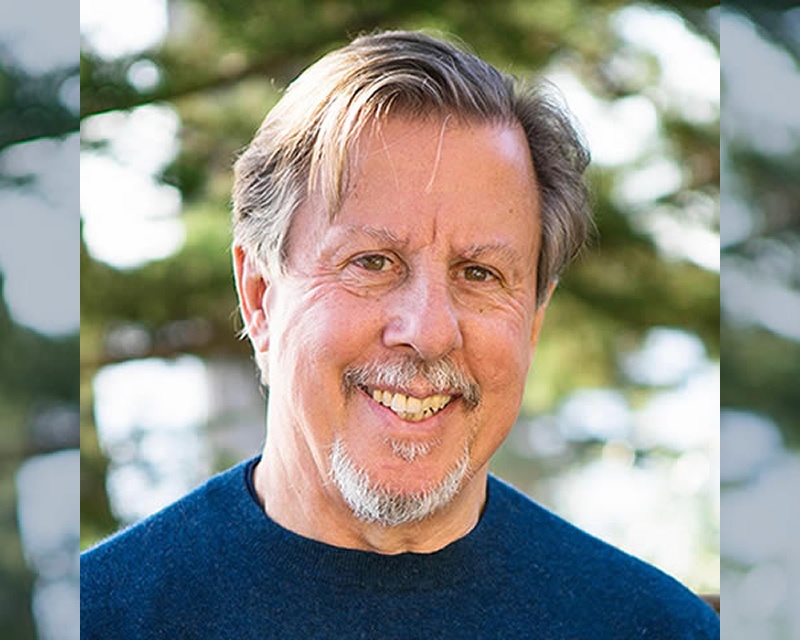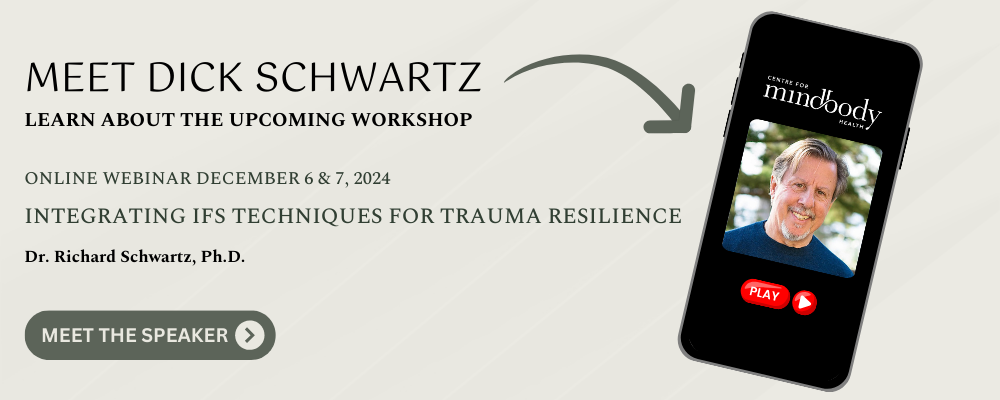Integrating IFS Techniques for Trauma Resilience
Facilitated by: Dr. Richard C. Schwartz
Dates: December 6 & 7, 2024
Time: 11:00am – 2:30pm (ET)
Location: Online via Zoom
Join The Centre for MindBody Health (CMBH) to explore Internal Family Systems (IFS) therapy led by Dr. Richard Schwartz. Acquire valuable insights for trauma work and elevate your skills.
Workshop Description
This workshop will provide a brief review of the basics of the IFS model by Richard Schwartz, PhD, who developed the model, then will focus in detail on its use with attachment and trauma. IFS is a non-pathologizing, hopeful framework within which to practice psychotherapy now certified as an evidence-based practice by SAMHSA. IFS offers both a conceptual umbrella under which a variety of practices and different approaches can be grounded and guided, and a set of original techniques for creating safety and fostering Self-to-Self connection in individuals, couples and families.
The workshop will focus on helping clients release personal burdens related to traumatic experiences in their lives. An overview of the clinical applications of IFS in trauma work will be presented. You will learn through didactic teaching, interactive dialogue, demonstration and live interviews.
As the workshops progress the focus will be on understanding and releasing legacy burdens. Legacy burdens are powerful organizers of our minds and behaviors. You will be become more aware of the beliefs and emotions we and our clients absorb from family, peers, ethnic groups and cultural contexts regarding ourselves and/or groups with whom we identify, as well as groups we consider “other.” We will explore the sources of those burdens and the fears of releasing them. This work is critically important to create more peace and less divisiveness in our often fractured world.
Grounded in systems thinking, Dr. Schwartz developed Internal Family Systems SM, in response to clients’ descriptions of various parts within themselves. He focused on the systemic relationships patterns among these parts that were similarly organized across clients. He found that when clients’ parts felt safe and were allowed to relax, they would experience spontaneously the qualities of confidence, openness, and compassion that Dr. Schwartz came to call the Self. He will show us how to support clients in that state of Self, to facilitate their healing of their own parts.
Learning Objectives
At the end of this 2 Day Workshop, participants will be able to:
- Identify the basic theory and principles of Internal Family Systems therapy
- Apply techniques to access their clients’ Self- a core of compassion and other leadership qualities
- Assess client “resistance” more effectively and with less effort
- Explain the effects of trauma on parts and Self
- Apply the model in treating trauma
- Assess awareness of their own parts and how those parts impact therapy
- Apply IFS principles to transference and counter-transference
Presenter
Dick Schwartz began his career as a family therapist and an academic at the University of Illinois at Chicago. There he discovered that family therapy alone did not achieve full symptom relief and in asking patients why, he learned that they were plagued by what they called “parts.” These patients became his teachers as they described how their parts formed networks of inner relationship that resembled the families he had been working with. He also found that as they focused on and, thereby, separated from their parts, they would shift into a state characterized by qualities like curiosity, calm, confidence and compassion. He called that inner essence the Self and was amazed to find it even in severely diagnosed and traumatized patients. From these explorations the Internal Family Systems (IFS) model was born in the early 1980s.
IFS is now evidence-based and has become a widely-used form of psychotherapy, particularly with trauma. It provides a non-pathologizing, optimistic, and empowering perspective and a practical and effective set of techniques for working with individuals, couples, families, and more recently, corporations and classrooms.
Dick lives with his wife Jeanne near Chicago, close to his three daughters and his growing number of grandchildren.
Course Fees
Regular: $325 CAD + HST = $367.25 CAD
Early-Bird Regular: $295 CAD + HST = $333.35 CAD
Student*: $225 CAD + HST = $254.25 CAD
Early-Bird Student*: $195 CAD + HST = $220.35 CAD
EARLY-BIRD DEADLINE: November 26, 2024
* Students must email a copy/scan of their valid student ID or confirmation of enrolment upon purchasing their ticket to:cmbhworkshops@gmail.com
** A 5% discount is available for groups of 5+ registering at the same time. Please email our Education Team for more details: cmbhworkshops@gmail.com
Registration Options
- Register online and pay with credit card. Registration opening soon.
- Email completed registration form and send an e-Transfer (payment + HST) to cmbh@cmbh.space
Registration Confirmation: Please allow 1-2 business days for our workshop staff to confirm your registration. We will email you an official receipt upon confirmation, including further details on workshop format and preparation materials.
Cancellation and Refund Policy: An administrative fee of $75 will be charged for cancellations. For a refund, written notification must be received by November 17, 2024. Written notice of cancellation should be emailed to cmbhworkshops@gmail.com. Refunds will not be issued after November 17, 2024. CMBH reserves the right to cancel workshops due to unforeseen circumstances.
Continuing Education (CE) Credits
OPA: Approved for 7 CE credits for Psychological Practitioners.
MDPAC: Approved for 6.5 hours of MDPAC Group CE credits and 1 hour of MDPAC CCI credits (automatically calculated when an MDPAC member submits Group CE hours).
OAMHP: Approved for 7 CE credits for members.
Participants must attend the entirety of the webinar in real-time to receive a certificate of completion detailing CE credits. Attendance will be noted manually by our workshop staff. Participants who are unable to attend the webinar in real-time may view the recordings once they are released and can be provided a questionnaire upon request to receive full CE credits.




